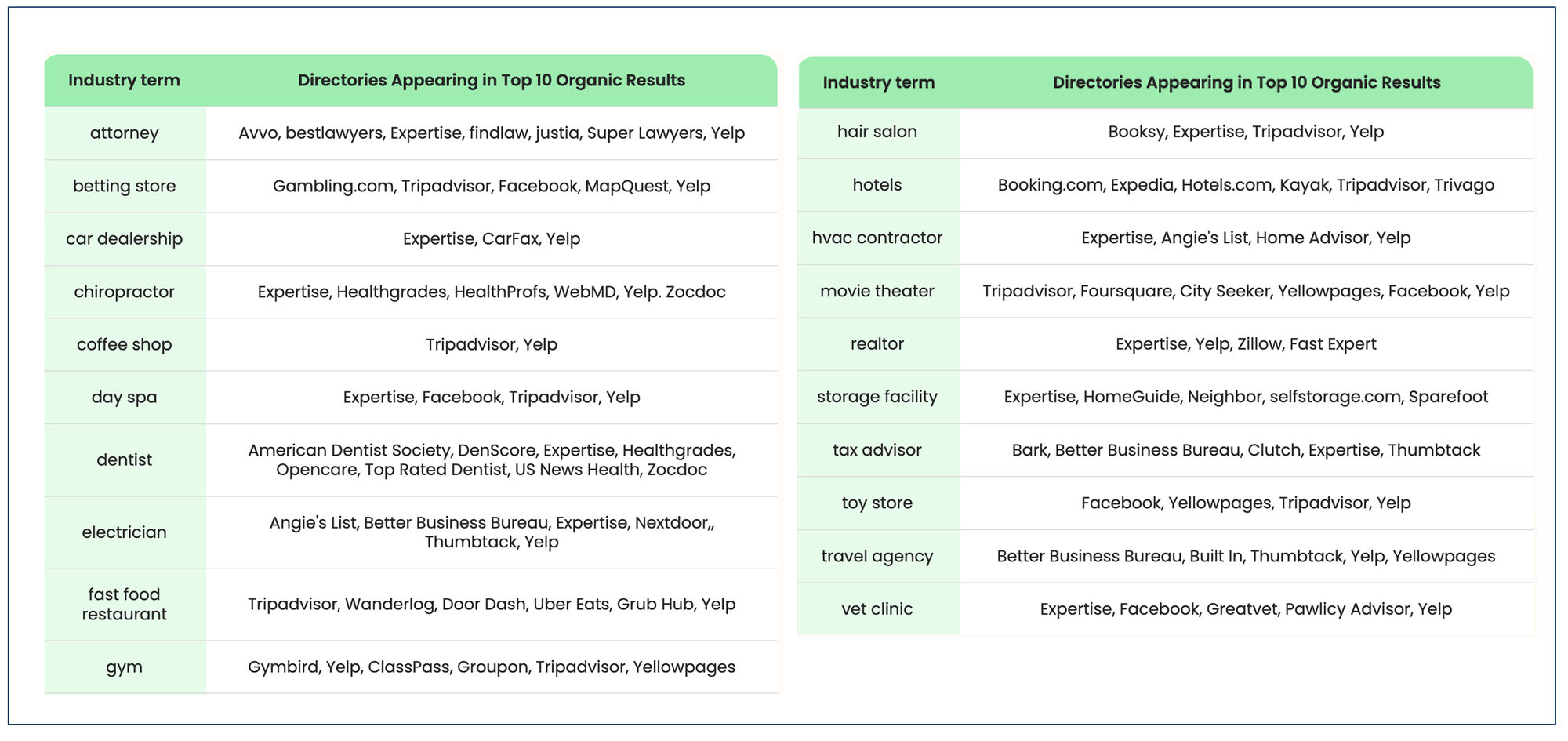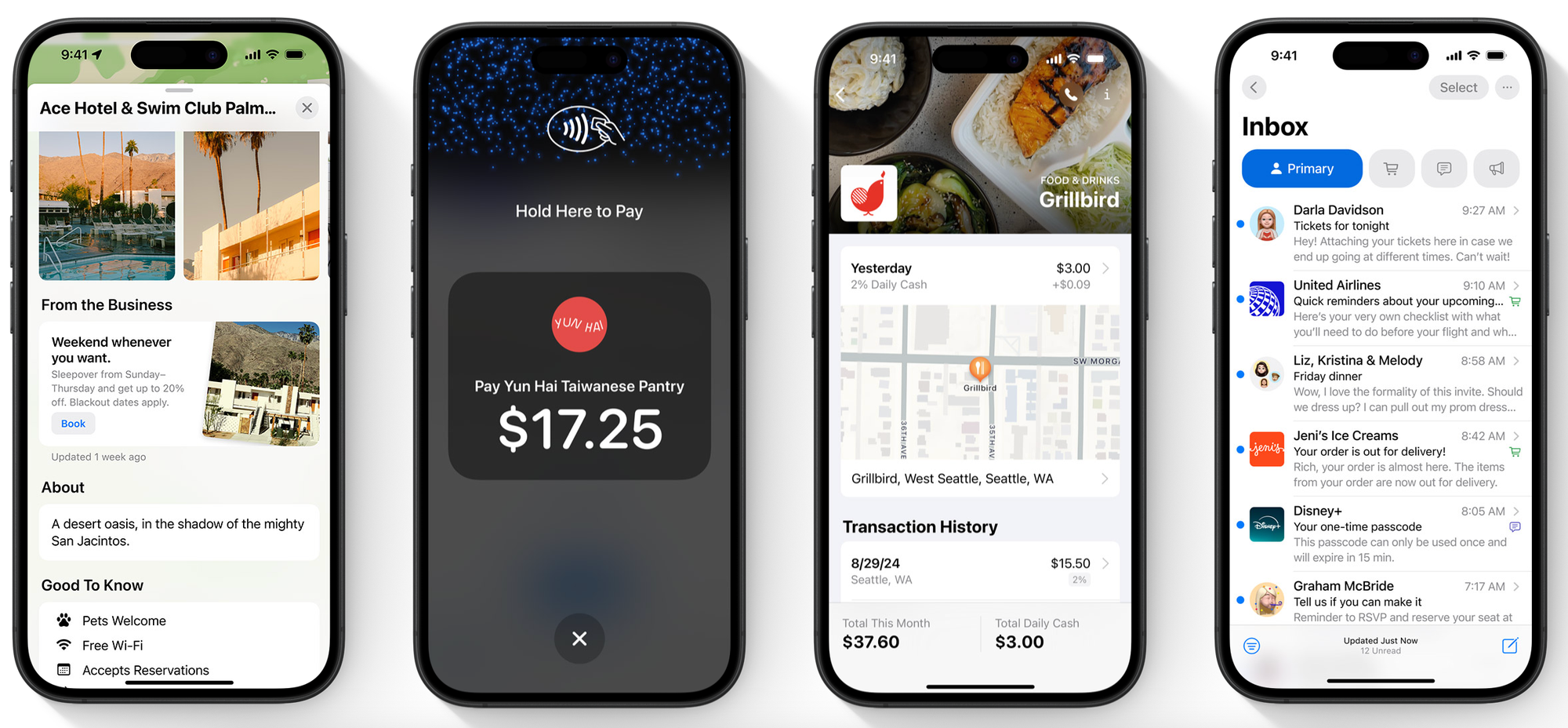Directories Matter, Apple Biz Connect, Trump ❤️ Google

Yes, Directories Matter
In 2014 - 2015, "local citations" and "NAP consistency" were seen by many SEOs as critical to local search visibility. Since that time, however, citations have declined in importance to the point where many Local SEOs now ignore "local listings management" entirely. Both Uberall and Yext, which offer these services, generated studies that argue listings management on a network of directories does still matter to local visibility. Now BrightLocal has produced research, based on "800 manual Google searches for local businesses ... [in] 20 different cities across the USA and 20 different business verticals," which shows directories are still very relevant. The study's purpose was to determine what actually shows up in the Google SERPs for local queries – both "informational" and "transactional." What BrightLocal found was that "directories make up almost a third of local-intent organic search results overall (31%)" and that these vary considerably by vertical. Indeed, Near Media has separately found the same thing in our user behavior research: directories matter in many verticals. But those directories are typically specific to each category, with exceptions like Yelp that appear in multiple verticals. Below is a chart that shows, across 20 categories, the 53 directories that BrightLocal found prominently appear in the top 10 organic results on Google.

Our take:
- At the SIINDA conference in Croatia, where we presented on Google DMA compliance, Yext argued listings management is important for AI search.
- Near Media found that when users engage with key vertical directories they evaluate listings as they might on GBP, looking closely at content, images, reviews. Your presence can't be thin or perfunctory.
- BrightLocal has definitively shown that directories still do matter. But SEOs need to be clear on which directories and actively manage them.
Time to Get on ABC
The shorthand way to describe Apple Business Connect (ABC) is that it's the company's version of Google Business Profiles. However, it's also broader and does more. And yesterday Apple expanded ABC with a number of new features and capabilities, which can also be utilized by home-based businesses and service businesses without physical storefronts. The new capabilities allow ABC listed businesses to customize and manage profiles – including prominent branding elements – across a range of Apple apps and experiences: Maps, Search, Safari, Mail, Wallet (and Tap to Pay), Siri and, later, the iPhone's caller ID. A dashboard will offer presence management, tips, analytics and lead tracking. Interestingly, Apple also says, "Businesses can also manage their location presence at scale through listing management agencies like DAC Group, Rio SEO, SOCi, Uberall, and Yext." These companies have API access and can manage multi-location brand data on ABC. Reportedly, there are millions of business users on ABC. However, it's clear that it's largely neglected by the SEO community and not well understood by local businesses themselves – many of whom don't use Google Business Profiles either. Apple points out there are more than 1 billion iPhone owners and 1.5 billion Apple devices that offer potential distribution for these new capabilities. Some of the new features (e.g., caller ID branding) won't roll out until next year.

Our take:
- ABC is arguably the biggest local (and branding) opportunity you're not taking advantage of.
- ABC is more important than Bing and, arguably, Yelp in terms of reach and potential visibility.
- To date Apple has not done a great job of educating business owners and agencies about ABC and why they should care. Hopefully that's changing.
Trump (Maybe) Rides to Google's Rescue
Elections make strange bedfellows. Just before the 2020 election the Trump Justice Department (DOJ) initiated the antitrust suit against Google, which the company recently lost under the Biden Justice Department. The latter is now looking at "structural remedies" (breaking up Google) among other fixes to restrain the company. The government wants to end Google's control over distribution and ensure "Google cannot control the distribution of tomorrow." But despite the fact that Trump, who claims Google is biased against him, instigated the original antitrust case, he's now saying that if re-elected he wouldn't pursue a breakup of the company because "China is afraid of Google." Instead he would do "something" to make Google more fair (to him). Beyond Trump's position being semi-incoherent, it's bizarre given the history. While the outcome of the election is uncertain, Trump riding to Google's rescue would be an ironic potential repeat of what happened to Microsoft when Bush II was anointed by SCOTUS in 2000. Microsoft had been designated a monopoly and the trial judge ordered a breakup. The case was on appeal when it settled and Microsoft escaped mostly unscathed. The market intervened in the form of Google (and the iPhone). But today Microsoft is more valuable than ever. The Google case may be on an identical trajectory.

Our take:
- While Trump's statements are not policy based, Harris is seen as tech-friendly. And so it's also unlikely Google would be broken up if she wins.
- The Biden DOJ may be floating the idea of a breakup primarily as a bargaining tool for any future settlement negotiations.
- It's clear, however, that Google is already leveraging it's market position to promote Gemini adoption, which the DOJ wants to block.
Recent Analysis
- Google AI Organized Restaurant search results, by Mike Blumenthal.
- Near Memo episode 178: Google tests AI organized carousels in local, Facebook tests new local tab, Google customer loyalty declines.
Short Takes
- Search Engine Land acquired by Semrush.
- Andrew Shotland's thoughts on who Semrush might buy next.
- Google Shopping gets a major AI upgrade.
- Popular products in the SERP: impact on SEO.
- GBP customer diss-service (long turnaround times).
- Europe DMA tips for SEOs (but read this, this, this, this too)
- FTC finalizes "click to cancel" subscription rules.
- Amazon revamps ads capabilities and analytics.
- Google adds new "cheapest" tab to Google Flights.
- Before Google's Quick View, Bing had similar zero-click feature.
- Forbes beating the Google algorithm yet again.
- Apple Vision Pro is a financial flop but surgeons, architects love it.
Listen to our latest podcast.

How can we make this better? Email us with suggestions and recommendations.

